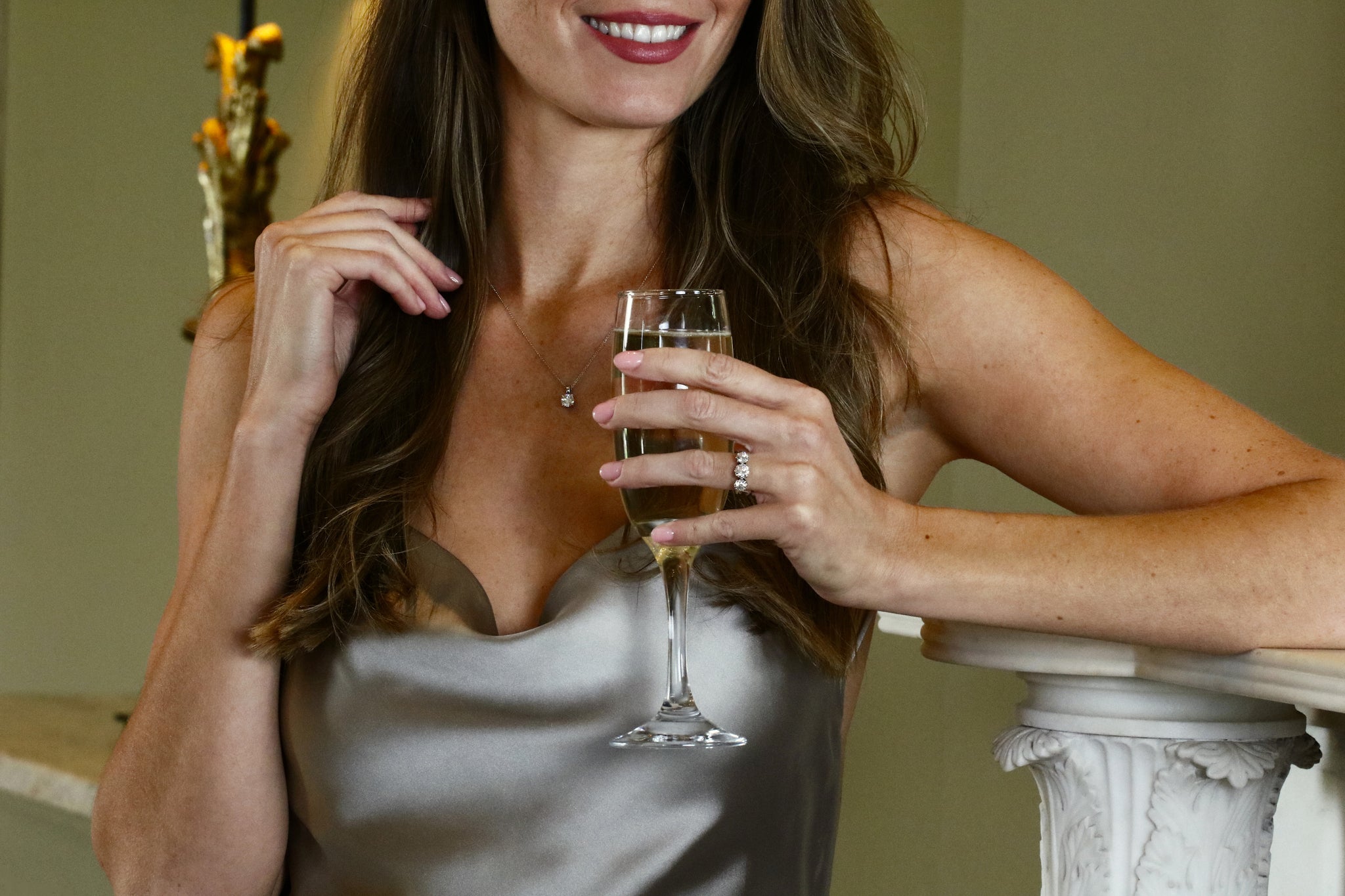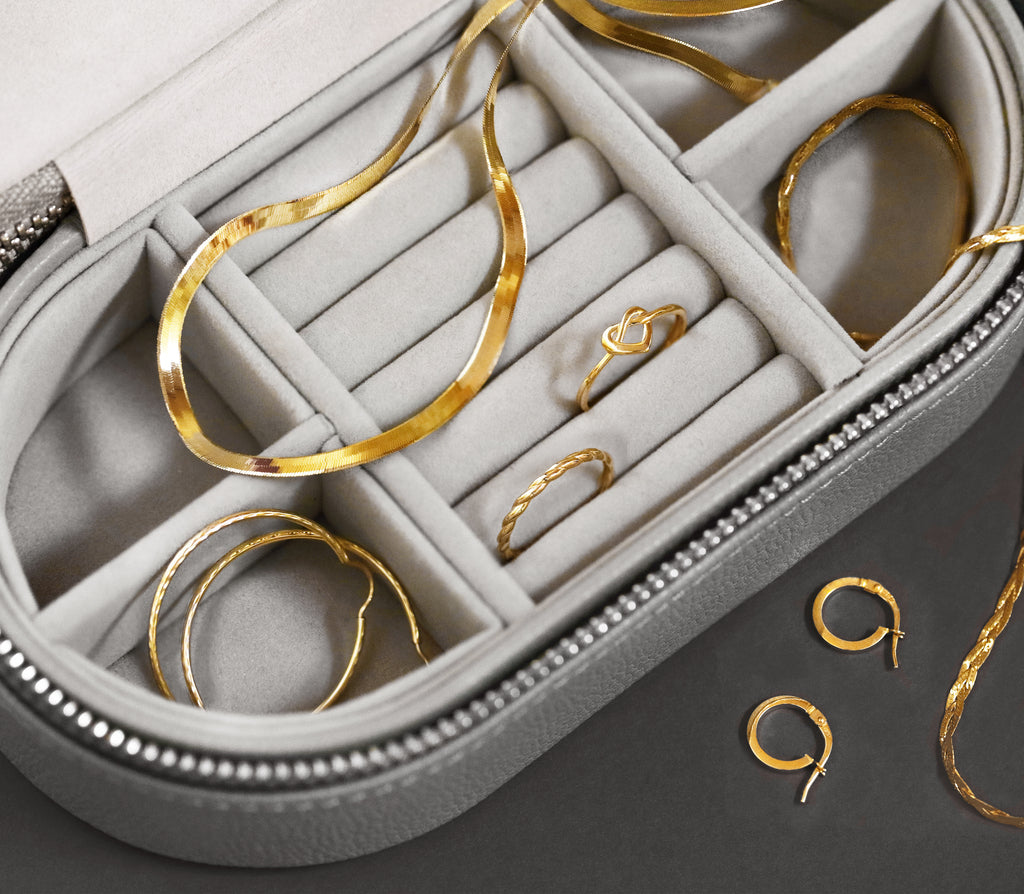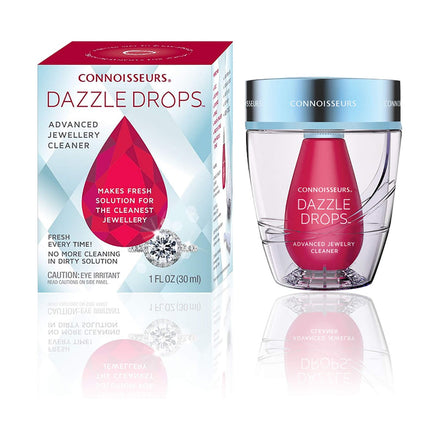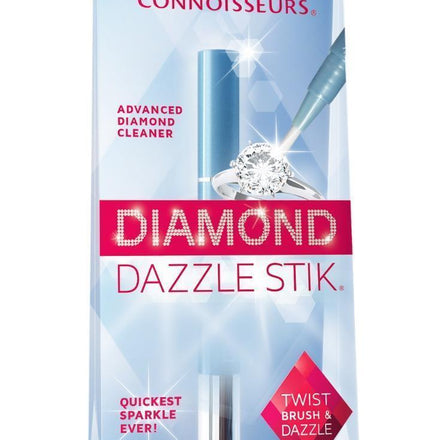White gold and platinum are both popular metal types for engagement rings. Both metals have their own unique characteristics and similarities, which makes a choice between the two a difficult decision. So, to help you choose the right metal for you and your partner, we have put everything you need to know in one place.
What is white gold?
The allure of white gold is a tale as old as time as this lustrous silvery metal has held notoriety in the jewellery industry for years, and for good reason. White gold is naturally a champagne colour due to its combination of yellow gold and metals such as palladium. The metal is then plated in rhodium for its classic white gold colour.
How is white gold formed?
Unlike the name dictates, white gold is not actually pure white. The metal is formed by mixing pure gold with a variety of white metals such as silver, nickel, and palladium to give it its sheen and vibrancy. The mixture of metals gives a soft champagne colour that is then rhodium plated to give the bright white colour we all love. You will start to see the soft champagne colour coming through more as time goes on (usually between 6-18 months depending on the person), the positive of the rhodium coating is that it can be reapplied. Leaving the ring to look brand new again and ready to wear.
What is unique about white gold rings?
White gold has incredible versatility, which makes it unique in the jewellery business. Its warm, white hue makes it a perfect timeless and classic choice that will match any existing jewellery collection. What’s more, it's a durable metal that has been used in jewellery for hundred of years. Here at Browns we are obsessed with white gold and love the way it works with our diamonds. See our full collection below.
Why is white gold mixed with other metals?
The reason why white gold is mixed with these other metals is it is far too malleable and soft to be used in its pure 24k gold form. If it were to be used in its natural state, then any jewellery made from it would very quickly bend out of shape. Therefore, the alloys make it durable and robust for everyday wear.
It is important to remember that different metals work best for different people. If your partner works in an industry where their hands may be working with chemicals for instance, you may find platinum is a better fit for you. This is because it may mean your white gold ring would require re-plating more often.
We host a wide range of Platinum rings that are often a similar price to our white gold collection. Find out more about this metal below.
What is platinum?
Pure, rare and eternal are three words that are often used in the jewellery industry to describe platinum. The rarest of the precious metals and the perfect choice for your engagement ring. Known as the iron fist in a velvet glove, platinum is hard wearing and feels fantastic to wear.
How is platinum formed?
Like other precious metals, platinum originates from deep within the earth’s crust and requires specific circumstances and chemical reactions to form. It is then mined and extracted for use in jewellery.
For jewellery use, platinum is generally alloyed with palladium, ruthenium, rhodium, copper, iridium, or titanium, to create a more malleable material that can be crafted into intricate pieces.
What is unique about platinum rings?
This naturally white, precious metal is rarer than gold and can at times come with a dearer price tag. Many individuals choose platinum due to its weight which makes it feel more substantial, and its exclusivity which gives it a unique worth. There is only enough platinum in the world to fill up to your ankles in one Olympic swimming pool, whereas you could fill three Olympic pools with the world’s gold.
Looking to find your unique ring? See our full collection of platinum rings below.
Is platinum scratch-proof?
Like all metals with wear platinum will scratch and become slightly matte. However, platinum is much more fluid than most metals meaning it can be polished to return the metal to its high shine. Scratches or ridging is natural and occurs when jewellery comes into constant contact with hard surfaces. Some individuals find this occurrence desirable and call it “the patina of age.” Many hope for it as it shows an item of jewellery that has been well-loved and gives the jewellery an heirloom feel.
White gold vs Platinum
Let’s look at white gold and platinum in closer detail to see which comes out on top for your engagement ring.
White Gold |
Platinum |
|
Colour |
Naturally a champagne colour made from a mixture of pure gold and alloys, rhodium coated for that crisp silvery tone. | Naturally white, has a cool grey undertone |
Longevity |
Requires re-plating | Naturally white no plating required. Perfect for day-to-day wear. |
Wearability |
Durable for everyday wear. Rhodium plating can be reapplied meaning a brand-new looking ring. Keep in mind your partners career and whether their hands may be working with chemicals (see platinum) |
Durable metal that can be polished if needed. |
Versatility |
Will compliment several gemstones, including diamonds and coloured stones | Will compliment several gemstones, including diamonds and coloured stones |
It is important to remember that whichever metal you choose we recommend removing your jewellery for bed, shower, swimming, and physical activity. This will help your jewellery last a lifetime. Cleaning your jewellery regularly can also ensure it lasts the test of time.
Can you tell the difference between platinum and white gold?
It is very hard to see a visual difference between the two metals. Platinum is a cooler grey toned metal whereas white gold shows a crisp silvery brightness.
Advantages and disadvantages of white gold and platinum
Overall, there are advantages and points to consider for each metal type.
Advantages of white gold:
• Suitable for a range of needs and preferences
• Has bright white silver tone to the metal.
• Pairs well with a range of diamonds and gemstones
Disadvantages of white gold:
• Needs to be re-plated over the years to keep its radiant shine
Advantages of platinum:
• Rare, exclusive and luxurious
• Long lasting and durable
• Pairs well with a range of diamonds and gemstones
• Hypoallergenic so is suitable for those with sensitivities
Disadvantages of platinum:
• Can sometimes be more expensive than other metal types
Why would you choose white gold?
So why choose white gold? White gold has been used in jewellery for hundreds of years and offers the classic touch of gold with a modern twist. Its durable for everyday wear and works well with any stone it is paired with. At times it can be lower in price than platinum allowing you to focus on the stone over the metal.
White gold’s versatility makes the metal a great choice for intricate designs. If you are wanting a unique design crafted just for you our bespoke team would be happy to help make your dream ring a reality.
Why would you choose platinum?
This low maintenance metal may be the perfect choice for you. Its naturally white all the way through and requires no plating. Platinum is hard wearing and can be polished if needed. Its rarity makes it an investment piece for the future and the perfect metal to pass through generations. It is also suited to those who are sensitive to metals due to it being hypoallergenic.
Looking for the perfect platinum ring? Browns hosts a whole collection of stunning options just for you.
Now that you know everything there is to know about white gold and platinum, you should be able to make a confident and informed decision when choosing your timeless jewellery piece. Remember whichever metal you choose we are here to help make your engagement ring journey as seamless as possible. Reach out to our team for a consultation.










